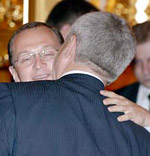A few years ago, in the Ogonyok event, actor Armen Jigarkhanyan confessed that if some day somebody threatened him with torture to give evidence or give witness about something he will definitely do so, because he’s afraid of threats and pain. During the same interview he told another story. After the performance of Oleg Yefremov, Gorbachev had personally called, and Jigarkhanyan was telling how amused Yefremov was when talking to Gorbachev on the phone. Yefremov really enjoyed talking to the first person of the republic. The person has his/her own character, and it’s impossible to give that up. When we meet the first persons of countries or famous artists or actors, we always think they are all so stingy, rich, sycophant and immoral. Meanwhile, no matter how bad they might have been, they were able to create masterpieces, which made their names remembered for centuries. Their masterpieces and creations spread beyond time and distance. Nobody remembers or sees the negative things that the famous have done during their lifetime. Their masterpieces and their legacy in world culture cover up all the negative deeds, for example, Michelangelo, Handel, Tchaikovsky, Byron, Goethe, etc. It’s even known that Dostoevsky was a gambler. He often had to write to pay his debts to casinos. Even the people who ordered to arrest the former minister of foreign affairs, Alexander Arzumanyan, are convinced that they ordered Arzumanyan’s arrest for something that does not exist. I do not know what the ex-foreign minister was going to use the money from Russia for, but it is obvious that he was not “laundering” that money, and the law enforcers have been unable to provide evidence several months now. No doubt, the people who searched his house and arrested him also know that they arrested an innocent person. However, Arzumanyan continues to be detained, and his relatives and friends are looking for optimal ways of helping Arzumanyan obtain his release as soon as possible. In fact, everything should be tried. However, in this period, a feeling of reality and clear-headed evaluation of the situation is necessary, especially when there is confidence that Arzumanyan’s arrest has a political context. Meanwhile, the government that ordered his arrest seems to have always evaluated the situation with a clear head and realistically. And among the initiatives for Alexander Arzumanyan there is one that seems to favor the government, which arrested Arzumanyan, rather than the detainee. And although it is the initiative of the relatives and friends of the ex-foreign minister, it nevertheless seems to be part of the government’s plan, which Alexander Arzumanyan’s defenders unintentionally fulfill out of the desire to help their relative and friend and release him as soon as possible. They have appealed to the prime minister of Armenia, Serge Sargsyan. The prime minister kept his promise and met with Melissa Brown, Arzumanyan’s wife. Apparently, Sargsyan has nothing to do with the government which illegally arrested Arzumanyan. If he is related, it is illogical to talk to him about releasing Arzumanyan, because thus Alexander Arzumanyan would be agreeing to negotiate with the government which illegally arrested him. However, the problem of appealing to Sargsyan goes much deeper. The prime minister is not authorized to release Arzumanyan because the national security service, which is by the way subject to the president of Armenia, proposed arresting the former foreign minister, and the proposal was approved by the court, which is not subject to the head of the government either. So what can Sargsyan do besides phoning the president, the head of the NSS, or the judge and ask, for the sake of friendship, to treat Arzumanyan fairly. And if they are fair, they will release him. It seems meaningless to have expectations, to expect any moves from Serge Sargsyan, because he is not authorized to deal with Arzumanyan’s case. Hence, it appears that a way was chosen for freeing the illegally detained Arzumanyan, which has nothing to do with the law. It is clear, of course, that in Armenia, no issues, especially the ones with a political context, are solved by the law, but by the persons who stand higher than the law. In this case, how reliable are the statements on illegal arrest, if the authors of this statement appeal to the system that resorted to this illegality. How are the released going to fight against the system led by this person, to whom they appealed for freedom and got freedom? And it is not quite clear whether in reality the people released after these appeals will get or lose freedom.

